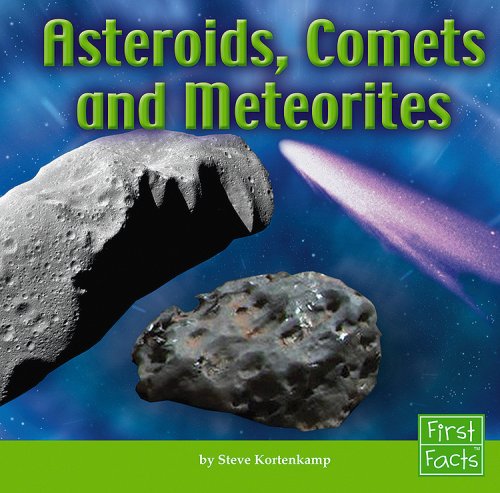-
Mars Exploration Rovers: An Interactive Space Exploration Adventure
Stephen John Kortenkamp
Paperback (Capstone Press, Aug. 1, 2016)Mars has been a source of fascination since H. G. Wells wrote The War of the Worlds, a sci-fi fantasy of green-eyed Martians invading and overpowering Earth. In 1971, engineers succeeded in placing a spacecraft into Mars’s orbit with the idea of finding out what was on Mars: Intelligent life? Water? A place people on Earth could move if need be? Since then, a number of missions to Mars have been launched. Now is your chance to help launch the Mars Exploration Rover. Do you have what it takes to succeed? V
V
-
Space Junk
Stephen John Kortenkamp
Library Binding (Capstone Press, Jan. 1, 2008)Describes the types of debris orbiting Earth and discusses the hazards space junk presents to spacecraft and astronauts. M
M
-
The Dwarf Planets
Stephen John Kortenkamp
Paperback (Capstone Press, Feb. 1, 2011)They’re round and orbit the Sun. But they’re not planets. What makes a dwarf planet different? Get up-close to the five dwarf planets that call our solar system home. T
T
-
The Planets of Our Solar System
Stephen John Kortenkamp
Paperback (Capstone Press, Feb. 1, 2011)Venus is a sweltering, spinning rock. Jupiter is a huge ball of gas. But they are both planets. Get up-close to the eight planets that orbit around our solar system. T
T
-
Show Me Space: My First Picture Encyclopedia
Stephen John Kortenkamp
Hardcover (Capstone Press, Feb. 1, 2013)From planets and comets to sunspots and spacewalks, there's so much to know about space! Show Me Space has more than 100 facts and definitions about our solar system and beyond. P
P
-
Demoting Pluto: The Discovery of Dwarf Planets
Stephen John Kortenkamp
Paperback (Capstone Press, Aug. 1, 2015)When is a planet not a planet? Dwarf planets orbit the sun, are solid bodies, and are not moons. But they are not considered regular planets. Learn more about these spherical oddities and why Pluto is still hotly debated today. U
U
-
Why Isn't Pluto a Planet?: A Book About Planets
Stephen John Kortenkamp
Library Binding (Capstone Press, Jan. 1, 2007)What is a planet anyway? How come Pluto isn't one? Are there any more planets? Scientists are learning more about these questions every day. Look inside to discover more about the mysteries of the planets in our solar system. N
N
-
Asteroids, Comets, and Meteoroids
Stephen John Kortenkamp
Paperback (Capstone Press, Aug. 1, 2011)They're leftover rocks from when the planets formed. And they hold clues to how the solar system began. Get up close to the asteroids, comets, and meteoroids that orbit our solar system. U
U
-
Future Explorers: Robots In Space
Stephen John Kortenkamp
Paperback (Capstone Press, Aug. 1, 2015)There's no air in space. But robots don't care! Learn more about how these mechanical robonauts can help us understand more about the solar system in which we live. T
T
-
The Dwarf Planets
Stephen John Kortenkamp
Library Binding (Capstone Press, Dec. 1, 2010)They’re round and orbit the Sun. But they’re not planets. What makes a dwarf planet different? Get up-close to the five dwarf planets that call our solar system home. T
T
-
The First Moon Landing
Stephen John Kortenkamp
Library Binding (Capstone Press, Sept. 1, 2007)Did you know that it took three days for the first astronauts to reach the moon? Or that the first men on the moon left experiments that scientists still use today? Explore the first moon landing and what it taught us about our solar system. M
M
-
Asteroids, Comets, and Meteorites
Stephen John Kortenkamp
Library Binding (Capstone Press, Sept. 1, 2007)Did you know that asteroids are leftovers from when the planets formed? Or that comets grow new tails every time they get near the Sun? Explore asteroids, comets, and meteorites, and their place in the solar system. M
M